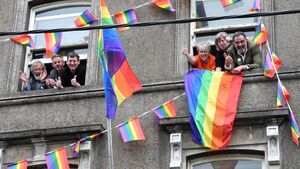Pride of the Déise 2024: Honouring Waterford's LGBTQ+ Community History

Pic; Larry Cummins
As we celebrate Pride month, it's not only a time for revelry and festivities but also a moment to reflect on the history of the LGBTQ+ community.
This year marks the 50th anniversary of the first Pride demonstration in Ireland, a pivotal moment in our journey toward equality and acceptance when twelve individuals marched to the British embassy to demand the decriminalisation of homosexuality.â¯
As we commemorate this milestone, it's imperative to recognise the importance of preserving our local community's history for generations to come.
For some months now there has been work going on in the background in planning a community history and heritage project which I am delighted to announce.
In delving into Waterford's LGBTQ+ history, we cannot overlook the tragic tale of John Atherton, the Anglican Bishop of Waterford and Lismore in the 17th century. Atherton's life serves as a reminder of the persecution faced by LGBTQ+ individuals throughout history.
Despite his notable contributions to the Anglican clergy, Atherton was ultimately condemned for buggery, a charge that led to his execution in 1640. His story not only highlights the fatal consequences of societal intolerance, it also provides a warning against horizontal hostility which occurs when individuals from marginalised groups perpetuate discrimination and oppression within their own community, or also towards other marginalised groups.â¯
In the case of John Atherton, this social psychology concept is particularly evident. In his role as Bishop, Atherton played a significant role in the introduction of laws that criminalised homosexuality in Ireland, petitioning for them to be introduced here after they had come into effect in England. His actions highlight how individuals can become complicit in systems of discrimination and oppression, even when they themselves are part of that marginalised community.
This historical example underscores the complexity of identity and power dynamics, revealing how individuals may perpetuate harm against their own community or other marginalised groups in pursuit of their own interests or to maintain their position of authority and power. It also shows us that when people do not accept part of themselves, this can turn into hate towards people who have accepted (and even embrace) these parts of their identity.â¯â¯
Understanding and acknowledging our history is paramount in fostering growth and progress as a society. By studying the events of the past, we gain valuable insights into the triumphs and failures of previous eras, allowing us to learn from their experiences and avoid repeating the same mistakes. History serves as a guiding light, offering us valuable lessons on the consequences of discrimination, oppression, and injustice.
It provides us with a deeper understanding of the complexities of human behaviour and societal dynamics, empowering us to make informed decisions and enact positive change in the present and future. In essence, knowing our history enables us to build a more compassionate, equitable, and inclusive world for all.
The inspiration for our upcoming project came while searching the Irish Newspaper Archives of the Munster Express newspaper from 1875. While trying to research for my history thesis on a completely unrelated topic, I stumbled upon a remarkable entry in a list of responses from a newspaper editor that sparked a journey into the LGBTQ+ history of the South East.
Among the pages, I found mention of a trans woman named Dora Copperfield from New Ross, Co. Wexford and reference to more trans women living as their authentic selves almost 150 years ago. This unexpected find inspired me to take a deeper dive into the untold stories of the LGBTQ+ community in the SouthEast region.â¯
We are launching a community history project and initiative which aims to document and celebrate Waterford's LGBTQ+ history through oral history interviews, archival research, and community engagement.
With the support of the Diverse Waterford program run by Waterford City and County Archives and Libraries service, this project seeks to ensure that the voices and experiences of LGBTQ+ individuals are preserved and celebrated for future generations.
Diverse Waterford have already carried out projects with the Travelling and Igbo communities in Waterford, as well as multiple other projects.⯠We invite all members of the LGBTQ+ community who have lived in or have ties to Waterford to join us in this endeavour.
Whether through sharing your personal stories, assisting with research, or donating materials to our archive, your contributions are invaluable in helping us honour our shared heritage. Together, let us ensure that the struggles and triumphs of our community are never forgotten, and that future generations can look back with pride on the waves of progress we've made.
As we embark on this journey to preserve Waterford's LGBTQ+ history, let us remember that by coming together as a community, we can ensure that our voices are heard, our stories are told, and our legacy endures for generations to come.⯠To find out more and get involved in the project, head to prideofthedeise.com or contact us via email at prideofthedeise@gmail.comâ¯â¯â¯






